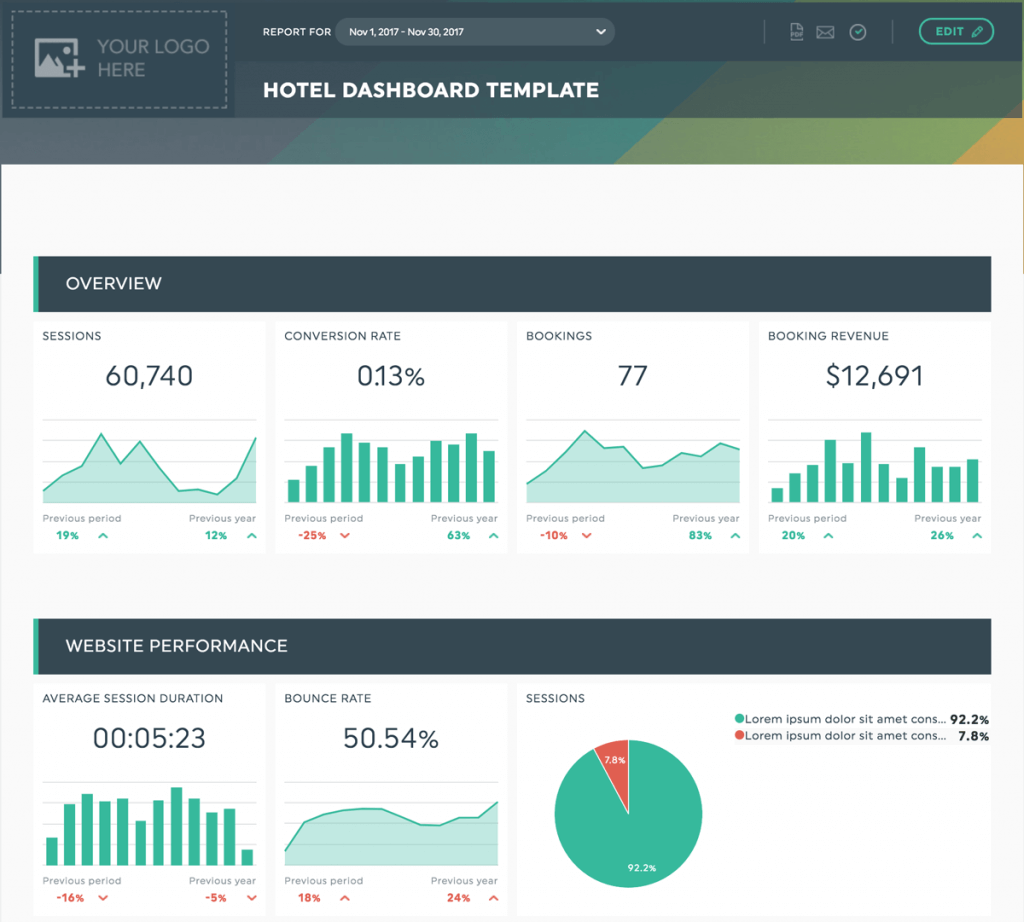How to Create a Hotel Dashboard That’ll Make You Say Hallelujah

When running a hotel, knowing how to create a hotel dashboard is essential. Yet, as you were most likely able to figure out by now, this could be heaven or this could be hell. Which metrics are important to your hotel and which aren’t? What are the KPIs you should keep track of?
You already know it: running a hotel means dealing with a huge amount of data, and this can quickly become overwhelming. There’s so much to be aware of simultaneously and so many sources to collect your data from, it’s only a matter of time before your head grows heavy and your sight grows dim due to this exhaustive tracking process.
Panic no more, dear hotel manager, for I’m here to light up a candle and show you the way to a wise hotel dashboard creation process. Below you will find 9 of the most useful KPIs you should save a space for in your hotel dashboard.
1. Conversion rate
In a business context, the word “conversion” has the meaning you want it to, but as a hotel manager, it will most likely reflect the booking of a stay at your hotel. The way you calculate it is up to what you consider useful, but it could equal the number of people who booked a stay at your hotel divided by the number of people who visited your website, or the number of people who booked a stay at your hotel divided by the number of people who saw your online ad, for example.
Your conversion rate gives a fairly good idea of how well you’ve been targeting your audience. Knowing how many people landed on your website or laid eyes upon your ad is one thing, but knowing how many of those people found your website or your ad useful enough so they ended up claiming “I had to stop for the night!” is way more relevant!
2. Average length of stay
You obviously want people to book as long a stay as possible, so this one is an essential KPI for your hotel dashboard. Knowing how long your guests usually stay at your hotel for can be a good indicator of how well your business is going.
You’ll be able to draw trends out of these numbers and hopefully find ways to work on your product value so the average length of stay (and hence average revenue per transaction) rises up through the air in the likes of a warm smell of colitas. How poetic is that?
3. Revenue per transaction
How much do people usually spend when booking a stay at your hotel? The length of their stay will obviously affect this number, but do clients also purchase extras? Are they aware of the extras you have to offer? Taking a look at the average revenue per transaction will help you target what changes could be made in your marketing strategy in order to get people to spend even more when making a reservation.
4. Number of paid bookings
Adding this metric to your hotel dashboard is bound to help you get a global picture of how healthy your PPC campaigns are. This number will tell you how many people booked a stay at your hotel after having seen your Facebook ad, AdWords ad or any other ad you’ve paid for. Keep track of this KPI and use it to better orient your next PPC campaign strategy!
5. Most traffic-driving keywords
Using your hotel dashboard to track your AdWords results is probably the best way to ensure your website doesn’t remain a dark desert highway. Which keywords appear as most relevant to your website visitors? This metric will help you adjust your AdWords game so that when people type certain keywords into a search engine and find your page, it actually gives them what they’re looking for.
So it’s certainly a good thing to know which words drive the most traffic to your website, but this KPI can’t be used alone: it needs to be considered along the following metric.
6. Most conversion-driving keywords
What are the keywords that lead people to take out their credit card and cross a check-in date off their calendar? Following this KPI through your hotel dashboard will help you see which keywords your website is most adapted to.
Since ultimately, you want people to find what they’re looking for on your website (and not the competitor’s), you wanna work on your AdWords strategy so that the most traffic-driving keywords and the most conversion-driving keywords end up being the same.
7. Number of followers per social media platform
As we all know, we are all just prisoners here of our own devices, and this is why social media engagement matters so much. Knowing how many people liked or unliked your page is always a good indicator of how said page is received by your clients and potential clients.
You can take this even further by tracking where these people are from, how old they are, if they’re mostly men or women… Having such chunks of information into your hotel dashboard will help you target the right audience when pushing ads forward on social media.
8. Engagement rate
This KPI shows how many people took an action toward a specific Facebook post, compared to how many people saw this post. An action can either be a comment, a share, a like or a reaction (sad/angry/laughing face, heart, etc.) This will help you adjust your post strategy. You don’t want people to just see your posts; you want them to interact, you wanna see them gather for the feast!
9. Number of subscribers/un-subscribers to your newsletter
If you have a newsletter, you need it to be so awesome that people will wanna subscribe, and remain subscribed. In order to achieve that, what you need above anything is awesome content.
Tracking your number of subscribers and un-subscribers in your hotel dashboard will certainly help you see if something needs to be adjusted about your newsletter strategy.
Bonus: Add relevant reviews
There are several channels through which people can interact publicly with your hotel, be it Facebook, Twitter, TripAdvisor or any other. Did people leave reviews on how they danced in the courtyard or rather on how there were voices down the corridor that woke them up in the middle of the night?
Such comments are very useful insight to help you see what people like most about your hotel and what could be improved. You can select the most relevant reviews, copy them into a CSV file and import them into your hotel dashboard.
Of course, all the above are only a mere sample of all the KPIs you could be tracking in your hotel dashboard, as there are plenty of other ones for you to discover. Test options, and find the ones that suit you best.
Managing a hotel can seem quite overwhelming, but rest assured: up ahead in the distance, there’s a shimmering light called DashThis, which happens to be just the kind of tool you’ve been dreaming of all along without even knowing it. It gathers all the data you need into a single hotel dashboard, it allows you to customize it at will, it makes it easy to share and, most importantly, it’s incredibly simple and completely automated!
Plus, you can get started right away by using our preset hotel dashboard template.

Sounds too good to be true? Well, it most definitely isn’t. Sign up now for a 14-day free trial and see for yourself!
It’s a promise: once you get a taste of everything DashThis can do for your hotel dashboard, you can sign out anytime you like, but you can never leave.
Ready to automate your reporting?
Read More
Don’t miss out!
Automate your reports!
Bring all your marketing data into one automated report.
Try dashthis for free

